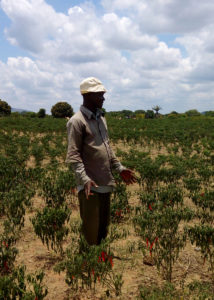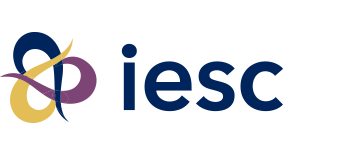With IESC Volunteer Support, EU Ban on Some Ghanaian Agricultural Exports Lifted
November 27, 2017–In early November the European Union (EU) announced that it will lift a ban on five agricultural products from Ghana beginning in 2018, a decision that will help Ghanaian farmers and the economy more broadly. Seeing the ban lifted was one of the primary objectives of the Improving Food Safety Systems Project, supported by the United States Agency for International Development (USAID).

Chili peppers are among the products that Ghanaian farmers can resume exporting to European markets, now that the ban has been lifted.
Beginning January 1, 2018, Ghanaian farmers may resume exports of eggplant, chili pepper, and three types of gourds into the EU market.
Since it launched in 2016, the Improving Food Safety Systems Project has engaged volunteer experts to address food safety issues that led to the ban in the first place. The project, known as IFSSP, brought together stakeholders and helped form a taskforce to address the ban.
”The European Union Commission’s decision to lift the current ban on the export of five plant commodities from Ghana is due in large to the collaborative efforts between the Ministry of Food and Agriculture and its stakeholders,” said ministry employee Kwesi Alabotey, who chaired the taskforce. “IFSSP is a strategic stakeholder whose assistance contributed to achieving this success.”
Specifically, IFSSP instituted standard operating procedures and delivered equipment and technology for inspection and testing. Volunteer expert Emily Zobel of the University of Maryland Extension Service worked with the plant protection division of the food and agriculture ministry to train produce inspectors and extension agents on how to identify pests and diseases.
Another volunteer expert, Ernst Neering, conducted a mock audit with the plant protection division, posing as an EU auditor, to determine if they were prepared for the real audit. Afterwards, he provided recommendations to help the division demonstrate that it had the systems and procedures in place to resume exporting vegetables to the EU.
We farmers are excited to hear the ban has been lifted. Chili production was one of our main sources of income, so the ban affected us badly.
Perhaps most significantly, IFSSP is developing a nationwide traceability system to determine when and where problems are introduced into agricultural products.
The ability to resume EU exports is especially good news for farmers. It is estimated that Ghana lost about $30 million in export revenue as a result of the ban.
“We farmers are excited to hear the ban has been lifted. Chili production was one of our main sources of income, so the ban affected us badly,” said James Amoquandoh of the Weija Irrigation Water Users Association, a vegetable farming cooperative. “This translates into more money for our pockets as we return to cultivating the crop. Most importantly, we as a cooperative are ensuring that our farmers adopt best practices to cultivate chili and attract exporters to buy from us.”
The Improving Food Safety System Project runs through September 2018. IESC implements the project through a grant under the Volunteers for Economic Growth Alliance Special Program Support Project, which is part of the USAID-funded Farmer-to-Farmer Program.
USAID is the lead U.S. Government agency working to end extreme global poverty and enable resilient, democratic societies to realize their potential.
The John Ogonowski and Doug Bereuter Farmer-to-Farmer Program provides technical assistance from U.S. volunteers to farmers, farm groups, agribusinesses and other agriculture sector institutions in developing and transitional countries with the goal of promoting sustainable improvements in food security and agricultural processing, production, and marketing.



